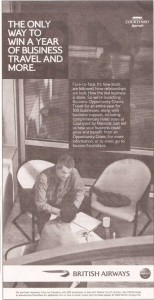by Eva Niewiadomski, Catalyst Ranch
This blog was originally written and posted by Blogger Harvey Chimoff on September 16, 2009. Harvey Chirnoff is a cross-functional marketing leader who relies on a special blend of pragmatic strategy, vision, organization, and action to achieve marketing and business results. Contact Harvey at hchimoff@att.net. Click here to see the original blog:
I’m always intrigued by companies that are able to promote and market without direct price cuts, especially during a time of declining demand.
The recession has wiped out a large amount of business travel, particularly international travel, and those who are still allowed to get their passports stamped find themselves traveling coach, even on long overseas flights. This poses a significant problem for airlines who make excellent margins on high-paying business travelers, especially those in business and even first class. And online meeting tools such as WebEx and GoToMeeting are making it easier for remote productivity. What to do?
One simple answer is to cut the price, but that doesn’t address the root cause of why cash-strapped companies have eliminated or curtailed business travel in the first place. A more sophisticated approach is to figure out a way to use this challenging economic climate for trial generation and customer retention so that the airline is better positioned when the economy rebounds. British Airways has come up with something clever, taking the idea of government stimulus and bailout spending and applying the concept for its own purposes with a new marketing program.
The airline commissioned research by the Harvard Business Review (2,200 business people) and found that 95 percent believe that face-to-face meetings are key to success in building long-term relationships, and 87 percent agree face-to-face meetings are essential for “sealing the deal.” More than half of those surveyed said recent restrictions on business travel have hurt their business.
In an effort to encourage more business travel, BA has developed ”Face-to-Face,” a contest promotion targeting small to medium sized businesses (500 employees or less). The cornerstone of the program is the ”Business Opportunity Grant,” with 100 winners receiving the following suite of business services:
• British Airways airfare for 10 round-trip Club World business class flights.
• 5 free British Airways World Cargo freight shipments of up to 500 kilos to worldwide destinations
• $1000 toward accommodation at Courtyard by Marriott
• 5 Regus Businessworld Gold Cards providing access to business lounges worldwide
• Canon PIXMA MX860 Wireless Office All-In-One Printer
You have to work for your money, though. Companies enter online and need to write essays about their objectives for 2010 and how a grant would help grow their business.

BA is using the new marketing to remind business travelers just how important the up close and personal touch is. Simon Talling-Smith, Executive Vice President Americas, explained: ”Face-to-face interaction fuels business. In these challenging times, you can keep relationships alive through faceless conference calls or live video conferences, but chances are they won’t grow much without some quality face time. These human connections matter, and it is from those connections that business flows.
Headline For Marketers: Price is and will always be a critical part of the marketing mix. Although sometimes necessary, marketers should strive to develop approaches beyond just straight price-cutting. Try to create a price benefit that can help build your business longer-term instead of just getting a one-time sales spike. It’s more powerful for building your brand and positioning if you can wrap the pricing mechanism within an activity that actually reinforces the key selling point of the product or service. In the case of British Airways, they’re reminding a key user segment why personal interaction, and hence business travel, is often a key business criterion for success. Business travel will return, even if it’s less than before. The airlines that can do a better job to retain existing users and potentially develop new users will be better positioned to capitalize post-recession.